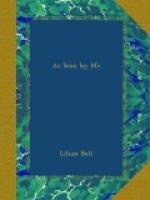I remember nothing definite about that first drive. I, for my part, saw with unseeing eyes. My sister had seen it all before, so she had the power of speech. Occasionally she prodded me and cried, “Look, oh! look quickly.” But I never swerved. “I can’t look. If I do I shall miss something. You attend to your own window and I’ll attend to mine. Coming back I will see your side.”
When we got beyond the shops I said to the cabman:
“Do you know exactly the way you have come?”
“Yes, miss,” he said.
“Then go back precisely the same way.”
“Have you lost something, miss?” he inquired.
“Yes,” I said, “I have lost an impression, and I must look till I find it.”
“Very good, miss,” he said.
If I had said, “I have carelessly let fall my cathedral,” or, “I have lost my orang-outang. Look for him!” an imperturbable British cabby would only touch his cap and say, “Very good, miss!”
So we followed our own trail back to “The Insular.” “In this way,” I said to my sister, “we both get a complete view. To-morrow we will do it all over again.”
But we found that we could not wait for the morrow. We did it all over again that afternoon, and that second time I was able in a measure to detach myself from the hum and buzz and the dizzying effect of foreign faces, and I began to locate impressions. My first distinct recollections are of the great numbers of high hats on the men, the ill-hanging skirts and big feet of the women, the unsteadying effect of all those thousands of cabs, carriages, and carts all going to the left, which kept me constantly wishing to shriek out, “Go to the right or we’ll all be killed,” the absolutely perfect manner in which traffic was managed, and the majestic authority of the London police.
I have seen the Houses of Parliament and the Tower and Westminster Abbey, and the World’s Fair, but the most impressive sight I ever beheld is the upraised hand of a London policeman. I never heard one of them speak except when spoken to. But let one little blue-coated man raise his forefinger and every vehicle on wheels stops, and stops instantly; stops in obedience to law and order; stops without swearing or gesticulating or abuse; stops with no underhanded trying to drive out of line and get by on the other side; just stops, that is the end of it. And why? Because the Queen of England is behind that raised finger. A London policeman has more power than our President.
Even the Queen’s coachmen obey that forefinger. Not long ago she dismissed one who dared to drive even the royal carriage on in defiance of it. Understanding how to obey, that is what makes liberty.
I am the most flamboyant of Americans, the most hopelessly addicted to my own country, but I must admit that I had my first real taste of liberty in England.
I will tell you why. In America nobody obeys anybody. We make our laws, and then most industriously set about studying out a plan by which we may evade them. America is suffering, as all republics must of necessity suffer, from liberty in the hands of the multitude. The multitude are ignorant, and liberty in the hands of the ignorant is always license.




